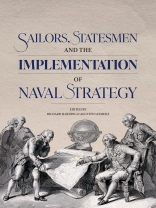Explores the varied relationship between political leaders and naval experts, from the 16th to 21st centuries
The shaping of national defence strategies is particularly difficult in the case of navies. Few political leaders have naval experience, in contrast to the case of armies where political leaders and army commanders have often shared similar social and professional backgrounds. Bringing together historical examples from Britain, the United States, Spain and France, the book provides insights into this key relationship.
The authors highlight factors which have made for successful relationships between political leaders and naval experts, showing how changing circumstances have affected the dialogue and underlines the importance of good exchange of knowledge, expertise and understanding for successful policy making and strategic outcomes. Sea power continues to be crucial in the present world’s increasingly unstable geopolitical situation, the mutual exchange of expertise between naval experts and political leaders is as important as ever, and the risk of political 'sea blindness’ remains high. This book’s historical examples provide good guidance on how to manage the relationship between political leaders and naval experts well.
Spis treści
List of Contributors
Introduction Naval Leadership: Expertise and Strategy, Richard Harding
1. The Evolution of French Naval Leadership: Defining the Admiralty of France from the Sixteenth to the Eighteenth Century, Alan James
2. The Makers of Spanish Naval Strategy in the Eighteenth Century: Strategy, Tactics and Shipbuilding Policy, Ivan Valdez-Bubnov
3. Naval Strategic Leadership in Britain, 1739-1748: Political Leaders and Professional Knowledge, Richard Harding
4. The Statesman and the Naval Leader: The Count of Floridablanca and Navy Minister Antonio Valdés, 1783-1792, Agustín Guimerá
5. Defining French Eighteenth-Century Naval Strategy, Olivier Chaline
6. Casto Méndez Núñez: The Admiral who could have been Regent, 1861-1868, Agustín Ramón Rodríguez González
7. Teaching by Example: Julian Corbett’s The Campaign of Trafalgar of 1910, Andrew Lambert
8. Spanish Naval Leadership during the Second Republic: José Giral Pereira, Adolfo Morales Trueba
9. The Quest to Understand Naval Leadership: Educating Admirals for High Command in the U.S. Navy from the 18th Century into the 21st Century, John B. Hattendorf
10. Reflections, Richard Harding
Bibliography
Index
O autorze
RICHARD HARDING is emeritus professor at the University of Westminster. He is author and editor of many books, including The Emergence of Britain’s Global Naval Supremacy: The War of 1739-1748 (2010) and Naval Leadership and Management, 1650-1950 (2012), both published by Boydell and Brewer.












